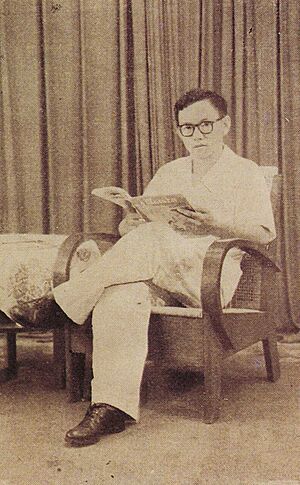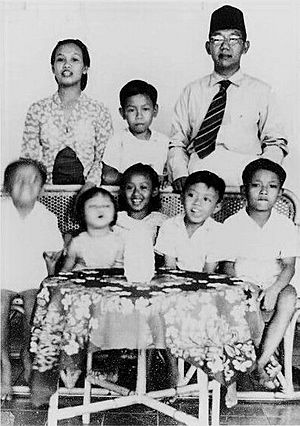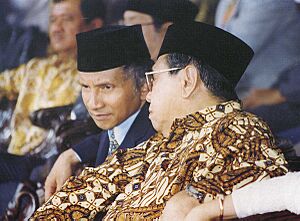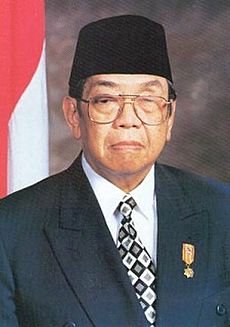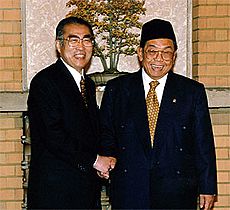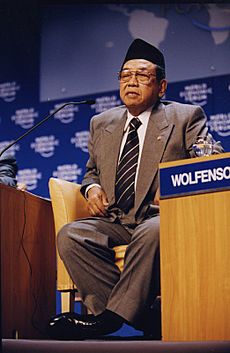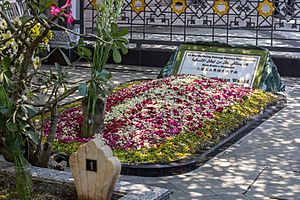Abdurrahman Wahid facts for kids
Quick facts for kids
Abdurrahman Wahid
|
|
|---|---|
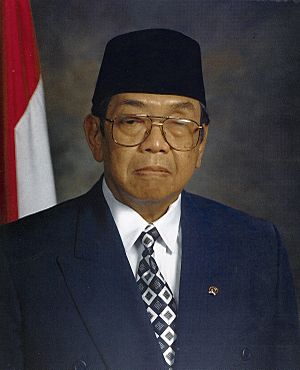
Official portrait, 2001
|
|
| 4th President of Indonesia | |
| In office 20 October 1999 – 23 July 2001 |
|
| Vice President | Megawati Sukarnoputri |
| Preceded by | B. J. Habibie |
| Succeeded by | Megawati Sukarnoputri |
| Chairman of the Nahdlatul Ulama | |
| In office 1984–1999 |
|
| Preceded by | Idham Chalid |
| Succeeded by | Hasyim Muzadi |
| Personal details | |
| Born |
Abdurrahman ad-Dakhil
7 September 1940 Denanyar, Jombang, Dutch East Indies |
| Died | 30 December 2009 (aged 69) Jakarta, Indonesia |
| Resting place | Jombang, East Java 7°36′26″S 112°14′17″E / 7.607243°S 112.237986°E |
| Nationality | Indonesian |
| Political party | National Awakening Party (PKB) |
| Spouse |
Sinta Nuriyah
(m. 1968) |
| Relations | Hasyim Asy'ari (grandfather) Salahuddin Wahid (brother) |
| Children | 4, including Zannuba Ariffah Chafsoh |
| Parents |
|
| Alma mater | Al-Azhar University (Islamic studies, 1967) University of Baghdad |
| Occupation |
|
| Signature |  |
Abdurrahman Wahid (born Abdurrahman ad-Dakhil; 7 September 1940 – 30 December 2009) was a very important Indonesian politician and Muslim religious leader. People often called him Gus Dur. He was the 4th president of Indonesia, serving from 1999 until 2001.
Gus Dur was a long-time leader of Nahdlatul Ulama, a huge Muslim organization. He also started the National Awakening Party (PKB). His father, Wahid Hasyim, was a government minister. His grandfather, Hasyim Asy'ari, founded Nahdlatul Ulama. Gus Dur had trouble seeing because of an eye condition called glaucoma. He was the first and only Indonesian president to have a physical disability.
His nickname 'Gus Dur' comes from 'Gus', a special title for the son of a religious teacher (kyai). 'Gus' also means 'handsome lad' in Javanese. 'Dur' is a short form of his name, Abdurrahman.
Contents
Early Life and Education
Abdurrahman ad-Dakhil was born on 7 September 1940, in Jombang, East Java. His parents were Abdul Wahid Hasyim and Siti Sholehah. He was named after an ancient Muslim leader who brought Islam to Spain. His family was very respected in the Muslim community of East Java.
His paternal grandfather, Hasyim Asy'ari, started the Nahdlatul Ulama organization. His maternal grandfather, Bisri Syansuri, was the first Muslim teacher to open classes for women.
After Indonesia became independent in 1945, Gus Dur moved to Jakarta. His father became the Minister of Religious Affairs. Gus Dur went to primary school in Jakarta. His father encouraged him to read many different kinds of books and newspapers. In 1953, his father died in a car accident.
In 1954, Gus Dur started junior high school. He had to repeat a year, so his mother sent him to Yogyakarta to continue his studies. In 1957, he moved to Magelang to study at a Pesantren (Islamic boarding school) called Tegalrejo. He finished the course quickly. In 1959, he returned to Jombang. There, he taught at a pesantren and worked as a journalist for magazines.
Studying Abroad
In 1963, Gus Dur received a scholarship to study at Al-Azhar University in Cairo, Egypt. He arrived in November 1963. He spent 1964 enjoying life in Egypt, watching movies and football. He also wrote for a magazine for Indonesian students.
After passing an Arabic exam, he started his studies in 1965. However, he was disappointed because he had already learned many of the subjects in Java. He also didn't like the way they taught by just memorizing things.
Gus Dur also worked at the Indonesian Embassy in Egypt. He was asked to write reports on Indonesian students' political views. This work, along with his dislike for the teaching style, made him less focused on his studies.
He then received another scholarship to the University of Baghdad in Iraq. He continued to be involved with Indonesian student groups and wrote articles for Indonesia. After finishing his studies in Baghdad in 1970, Gus Dur traveled to the Netherlands, Germany, and France. He returned to Indonesia in 1971.
Early Career in Indonesia
When Gus Dur returned to Jakarta, he planned to study in Canada later. He joined an organization called LP3ES, which was made up of smart people with modern Muslim and social ideas. He wrote for their magazine, Prisma. He also visited many pesantren (Islamic schools) across Java. He was worried that these traditional schools were losing their values because they needed government money. He also saw how poor many pesantren were. He decided to focus on helping these schools instead of studying more abroad.
Gus Dur continued to work as a journalist for popular magazines and newspapers like Tempo and Kompas. His articles were very popular, and he became known as a social commentator. He was often invited to give talks and seminars.
Even with a successful career, Gus Dur sometimes struggled financially. He sold peanuts and delivered ice to help his wife's popsicle business. In 1974, he started teaching Muslim law at a pesantren in Jombang. A year later, he also taught Sufism, a mystical branch of Islam.
In 1977, Gus Dur became the Dean of the Faculty of Islamic Beliefs at Hasyim Asyari University. He was very good at his job. He also gave speeches to the Muslim community during the holy month of Ramadan.
Leader of Nahdlatul Ulama
Joining NU Leadership
Because of his family's history, Gus Dur was expected to join the leadership of Nahdlatul Ulama (NU). He had turned down offers twice before. But when his own grandfather, Bisri Syansuri, asked him a third time, he agreed. He moved from Jombang to Jakarta. Gus Dur wanted to bring new ideas and changes to NU.
He also got his first taste of politics. Before the 1982 elections, he campaigned for the United Development Party (PPP), a Muslim party. He remembered that the government tried to stop their campaigns. But Gus Dur always managed to get released because he knew important people in the government.
Making Changes in NU
Many people thought NU was not growing or changing. So, the Religious Advisory Council formed a "Team of Seven," including Gus Dur, to help revitalize NU. Some members wanted the current NU chairman, Idham Chalid, to resign. Idham first refused but later agreed. Gus Dur convinced Idham to take back his resignation, and they worked out a deal.
In 1983, President Suharto was re-elected. He wanted all organizations to follow the state's main idea, Pancasila. Gus Dur was part of a team that decided NU should accept Pancasila as its guiding principle. To make NU stronger, Gus Dur also successfully led NU to leave party politics. This allowed NU to focus on social issues instead of political ones.
Becoming Chairman
Gus Dur's changes made him very popular in NU. At the 1984 National Congress, many people wanted him to be the new chairman. Gus Dur agreed, but only if he could choose his own leadership team. He was elected chairman. However, his condition was not fully met. The committee in charge announced a different list of team members. Gus Dur was upset but was pressured to accept it.
President Suharto liked Gus Dur becoming NU chairman. Gus Dur's acceptance of Pancasila and his moderate views made the government happy. In 1985, Suharto even made Gus Dur a teacher of Pancasila. In 1987, Gus Dur supported Suharto's party, Golkar, in the elections. He was rewarded with a seat in the MPR (People's Consultative Assembly). Even though he was favored by the government, Gus Dur criticized them about the Kedung Ombo Dam project. This made their relationship a bit difficult, but Suharto still wanted NU's political support.
During his first term, Gus Dur worked on improving the pesantren education system. He helped them become as good as regular schools. He also started study groups for NU members to discuss Muslim texts. Some critics accused Gus Dur of wanting to change traditional Muslim greetings to secular ones, but he denied it.
Second Term and Opposing Suharto
Gus Dur was re-elected as NU chairman in 1989. By this time, Suharto was trying to get more support from Muslim groups. In 1990, the Indonesian Association of Muslim Intellectuals (ICMI) was formed, supported by Suharto. Gus Dur refused to join ICMI because he felt it caused divisions and was just a way for Suharto to stay in power. In 1991, Gus Dur started the Democracy Forum, an organization with 45 smart people from different religions and communities. The government saw this as a threat and tried to stop their meetings.
In March 1992, Gus Dur planned a big event to celebrate NU's anniversary and show support for Pancasila. He expected a million NU members to attend. However, Suharto tried to block the event by ordering police to stop buses full of NU members. Still, 200,000 people attended. After the event, Gus Dur wrote a letter to Suharto, saying NU wasn't allowed to show its open and tolerant side of Islam. During his second term, some of Gus Dur's liberal ideas, like promoting talks between different faiths and even visiting Israel in 1994, made some supporters unhappy.
Third Term and the Road to Reform
As the 1994 NU Congress neared, Gus Dur wanted to be chairman for a third term. Suharto did not want him to be re-elected. Suharto's supporters tried to campaign against Gus Dur. The Congress site was heavily guarded by the military to scare people. Despite this, and attempts to bribe NU members, Gus Dur was re-elected.
During his third term, Gus Dur became closer to Megawati Sukarnoputri, a popular political leader. Megawati wanted to challenge Suharto's government. Gus Dur advised her to be careful. Megawati didn't listen and faced problems when her party's office was taken over by government-backed supporters in 1996.
Seeing this, Gus Dur decided to try and improve his relationship with the government. He met with Suharto and other government officials. But at the same time, he also met with other leaders who were critical of Suharto, like Amien Rais.
In July 1997, the Asian Financial Crisis began, and Suharto started losing control. In January 1998, Gus Dur had a stroke. From his hospital bed, he saw the situation worsen with student protests. In May 1998, after four students were killed, riots broke out. Gus Dur and other leaders met with Suharto but refused to join his proposed Reform Committee. Gus Dur called for calm, hoping Suharto would keep his promises. But support for Suharto quickly disappeared, and he resigned on 21 May 1998. Vice President B. J. Habibie became president.
The Reform Era (Reformasi)
Starting PKB and the Ciganjur Statement
After Suharto stepped down, many new political parties were formed. People in the NU community asked Gus Dur to start a new party. At first, he wasn't sure because he didn't want a party just for one religion. But by July 1998, he agreed, thinking it was the only way to challenge the strong Golkar party. He approved the creation of the National Awakening Party (PKB) and became its Advisory Council chairman. Even though many NU members joined, Gus Dur said PKB was for everyone, not just Muslims.
Gus Dur, Megawati, and Amien Rais took a calm approach to Habibie's government. They decided to wait for the 1999 elections. In November 1998, at Gus Dur's home, he, Megawati, Amien, and Sultan Hamengkubuwono X all confirmed their commitment to reform. In February 1999, PKB officially announced Gus Dur as their candidate for president.
1999 Elections and Becoming President
In June 1999, PKB won 12% of the votes in the elections. Megawati's party, PDI-P, won the most votes with 33%. Megawati expected to become president. However, her party didn't have a full majority. Amien Rais then formed a group of Muslim parties called the Central Axis. This group decided to nominate Gus Dur as a third candidate.
In October 1999, the MPR (People's Consultative Assembly) met. Gus Dur supported Amien Rais, who was elected as the MPR chairman. On 7 October, Amien and the Central Axis, now with PKB's support, officially nominated Gus Dur for president. On 19 October, the MPR rejected Habibie's speech, and he withdrew from the race. The head of Golkar, Akbar Tanjung, said Golkar would support Gus Dur. On 20 October 1999, the MPR voted, and Gus Dur was elected as Indonesia's fourth president with 373 votes, while Megawati got 313.
Megawati's supporters were very unhappy and started to riot. Gus Dur realized that Megawati needed to become vice president to stop the unrest. He convinced others not to run for vice president and persuaded Megawati to stand. On 21 October 1999, Megawati won and became vice president.
Presidency
First Steps as President (1999)
Gus Dur's first cabinet, called the National Unity Cabinet, included members from many different political parties. He made two important changes: he closed the Ministry of Information, which Suharto used to control the media, and he closed the Ministry of Social Affairs, which had become corrupt.
In November, Gus Dur made his first trips overseas, visiting countries in Southeast Asia, Japan, the United States, and several Middle Eastern countries. In December, he visited China.
After only a month, one of his ministers, Hamzah Haz, resigned. Some thought it was because Gus Dur had hinted that some ministers were corrupt. Others believed it was because Gus Dur was open to having relations with Israel.
In Aceh, Gus Dur wanted to offer a special vote. This vote would be about different ways Aceh could govern itself, not about becoming independent. He also wanted to reduce the number of soldiers in Aceh. In December, he visited Papua (then called Irian Jaya). He convinced Papuan leaders that he would bring positive change and even encouraged them to use the name Papua.
Challenges and Changes (2000)
In January 2000, Gus Dur traveled to Switzerland for the World Economic Forum. He also visited Saudi Arabia. In February, he went on another trip to Europe, visiting the UK, France, the Netherlands, Germany, and Italy. He also visited India, South Korea, Thailand, and Brunei. In March, he visited East Timor. In April, he went to South Africa and Cuba. In June, he visited America, Japan, France, Iran, Pakistan, and Egypt.
Cabinet Changes
While traveling in Europe in February, Gus Dur asked for the resignation of General Wiranto, a powerful minister. Gus Dur wanted to reform the military and felt Wiranto was holding back these changes. Wiranto tried to convince Gus Dur to let him stay, but Gus Dur eventually asked him to resign. In April 2000, Gus Dur also fired two other ministers, Jusuf Kalla and Laksamana Sukardi. He said they were involved in corruption, but he didn't provide proof. This made his relationship with Golkar and PDI-P worse.
Peace Efforts in Aceh
In March 2000, Gus Dur's government started talks with the Free Aceh Movement (GAM), a group fighting for independence. In May, they signed an agreement to last until early 2001.
Other Reconciliation Efforts
In March 2000, Gus Dur suggested lifting the ban on teaching Marxism (a political idea). He also wanted to start business relations with Israel. This made many Indonesian Muslim groups angry. Gus Dur believed that Islam was not against Israel, and that some people confused Arab politics with Islamic beliefs. He said Indonesia had relations with countries that were officially atheist, so there was no reason not to have relations with Israel.
Relationship with the Military
One of Gus Dur's main goals was to reform the military and reduce its power in politics. He appointed Agus Wirahadikusumah to a key military position. In July, Agus found a corruption scandal involving a military foundation. Military leaders, through Megawati, pressured Gus Dur to remove Agus. Gus Dur gave in but then tried to make Agus the Army Chief of Staff. The military leaders threatened to resign, and Gus Dur again backed down.
Gus Dur's relationship with the military got worse in July 2000. It was found that a radical Islamic group called Laskar Jihad had arrived in Maluku and was being armed by the military. Gus Dur had ordered the military to stop Laskar Jihad from going to Maluku, but they still got there and received military weapons.
Financial Scandals
In 2000, Gus Dur faced two scandals that hurt his presidency. In May, US$4 million went missing from the national logistics agency (BULOG). The money was linked to Gus Dur's masseur, who claimed Gus Dur sent him to collect it. Even though the money was returned, Gus Dur's opponents accused him of being involved. At the same time, he was also accused of keeping US$2 million that was a donation from the Sultan of Brunei for aid in Aceh. Gus Dur couldn't explain where the money went.
MPR Session and Cabinet Reshuffle
Before the 2000 MPR Annual Session, Gus Dur was still popular. His allies like Megawati and Akbar still supported him, despite the minister firings and scandals. But they also had questions for him. Gus Dur gave a speech where he admitted he wasn't good at managing the government day-to-day. He said he would let a senior minister handle it. The MPR agreed and suggested Megawati should do it. On 23 August, Gus Dur announced a new cabinet, but Megawati was unhappy and didn't attend the announcement. The new cabinet was smaller and had fewer political party members.
Regional Problems
In September, Gus Dur declared a state of emergency in Maluku because the situation was getting worse. It was clear that Laskar Jihad was being helped by military members and funded by a former finance minister. In the same month, people in West Papua raised their Morning Star flag. Gus Dur allowed this, as long as it was placed lower than the Indonesian flag. Megawati and Akbar criticized him for this. On 24 December 2000, there were terrorist attacks on churches across Indonesia.
Growing Opposition
By the end of 2000, many political leaders were unhappy with Gus Dur. Amien Rais, who had supported Gus Dur for president, now regretted it. He tried to get Megawati and Akbar to challenge Gus Dur. Megawati surprisingly defended Gus Dur, while Akbar preferred to wait for the 2004 elections. In November, 151 members of parliament signed a petition to remove Gus Dur from office.
Removal from Power (2001)
In January 2001, Gus Dur announced that Chinese New Year would become an optional holiday. In February, he lifted the ban on Chinese characters and publications. He also visited North Africa and Saudi Arabia for the hajj pilgrimage. His last overseas trip was to Australia in June 2001.
On 27 January 2001, Gus Dur hinted that he might dissolve the parliament (DPR) if the country became chaotic. This caused a big stir. On 1 February, the DPR issued a formal warning against Gus Dur. Two warnings could lead to a special MPR session to remove a president. The vote for the warning was very strong, and PKB members walked out in protest. This warning caused protests by NU members, who supported Gus Dur. In East Java, NU members damaged Golkar offices. Gus Dur denied encouraging the protests and asked his supporters to go home. However, NU protesters continued to show their support.
In March, Gus Dur tried to fight back by removing ministers who opposed him. He fired the Minister of Justice and the Minister of Forestry. Megawati started to distance herself and didn't attend the inauguration of the new ministers. On 30 April, the DPR issued a second warning and called for a special MPR session on 1 August. On 12 June, Gus Dur changed his cabinet again to try and gain more support.
By July, Gus Dur became desperate. He ordered his security minister, Susilo Bambang Yudhoyono, to declare a state of emergency. Yudhoyono refused, and Gus Dur fired him. Finally, on 20 July, Amien Rais announced that the MPR Special Session would be moved forward to 23 July. The military, which had a difficult relationship with Gus Dur, sent 40,000 troops to Jakarta and pointed tanks at the Presidential Palace. To stop the MPR session, Gus Dur issued a decree on 23 July to disband the MPR, even though he didn't have the power to do so.
Ignoring Gus Dur's decree, the MPR continued its special session. They voted unanimously to remove Gus Dur from office. In the same session, the MPR voted for Megawati to become president. Gus Dur insisted he was still president and stayed in the palace for a few days. But on 25 July, he left the palace for health treatments overseas.
After the Presidency
PKB Division
After being removed from office, Gus Dur focused on Matori Abdul Djalil, who was the chairman of PKB. Before the MPR session, PKB members had agreed not to attend as a sign of support for Gus Dur. However, Matori attended and participated in the impeachment. Using his power as chairman of the Advisory Council, Gus Dur fired Matori as PKB chairman in August 2001. Matori then held his own meeting in January 2002, where his supporters re-elected him as PKB chairman. Gus Dur responded by holding his own PKB meeting, where he was re-elected as chairman of the Advisory Council. This led to two different PKB groups.
2004 Elections
In April 2004, PKB won 10.6% of the votes in the national elections. Gus Dur was nominated as their presidential candidate. However, he failed a medical exam required by law, so he couldn't run. Gus Dur then supported Wiranto of the Golkar party, whose running mate was Gus Dur's brother, Salahuddin. Wiranto and Salahuddin came in third place. For the second round of elections in September 2004, Gus Dur didn't support either candidate and chose not to vote.
Opposing the Yudhoyono Government
In August 2005, Gus Dur became a leader of a political group that criticized President Yudhoyono's government. They were especially against the government's decision to remove fuel subsidies, which would make fuel more expensive.
In September 2006, Gus Dur said he would run for president again in 2009. He confirmed this in March 2008.
Other Activities
Gus Dur founded The Wahid Institute in 2004, a non-profit organization that is now led by his daughter, Yenny Wahid. He also worked with the LibForAll Foundation, which aims to reduce religious extremism and terrorism.
In 2005, Gus Dur wrote an article called Right Islam vs. Wrong Islam. In it, he asked people of all faiths to unite against religious hatred that leads to terrorism. He also shared his thoughts on the Bali bombings in a documentary, suggesting possible government involvement.
Religious Views
Gus Dur strongly supported dialogue and understanding between different religions. He was part of the Board of World Religious Leaders for the Elijah Interfaith Institute.
Personal Life
Gus Dur was married to Sinta Nuriyah. They had four daughters: Alissa Qotrunnada Munawaroh, Zannuba Arifah Chafsoh (known as Yenny Wahid), Annita Hayatunnufus, and Inayah Wulandari.
Health Issues
Gus Dur had poor eyesight throughout his presidency due to glaucoma, which started in 1985. He also had an accident that damaged his retina. He relied on trusted assistants to help him see. Some people also said he had a sleeping disorder because he sometimes fell asleep during important meetings.
Death
In late December 2009, despite being very ill, Gus Dur wanted to visit Rembang and Jombang. During the trip, his health got worse, and he was admitted to a hospital in Jombang on 24 December 2009. He was then moved to a hospital in Jakarta the next day for dialysis (a treatment for kidney problems). He also had dental surgery.
Gus Dur died on 30 December 2009, at about 6:45 pm local time. He passed away due to problems from kidney disease, heart disease, and diabetes. President Susilo Bambang Yudhoyono visited him shortly before he died. A state funeral was held for Gus Dur on 31 December, and flags were flown at half-mast for seven days. He was buried next to his grandparents and parents in his hometown of Jombang, East Java.
Awards and Honours
- In 1993, Abdurrahman Wahid received the prestigious Magsaysay Award. This award is often called 'Asia's Nobel Prize'. He received it for his work in promoting good relationships between different religions in Indonesia.
- He received honorary doctorates (special degrees) from many universities around the world, including in Israel, South Korea, Japan, Thailand, and France.
National Honours
 Star of the Republic of Indonesia, 1st Class (2001)
Star of the Republic of Indonesia, 1st Class (2001) Star of Mahaputera, 1st Class (2001)
Star of Mahaputera, 1st Class (2001) Star of Mahaputera, 2nd Class (1998)
Star of Mahaputera, 2nd Class (1998) Star of Mahaputera, 3rd Class (1998)
Star of Mahaputera, 3rd Class (1998) Star of Merit, 1st Class (2001)
Star of Merit, 1st Class (2001) Star of Culture Parama Dharma (2001)
Star of Culture Parama Dharma (2001) Star of Yudha Dharma, 1st Class (2001)
Star of Yudha Dharma, 1st Class (2001) Star of Kartika Eka Paksi, 1st Class (2001)
Star of Kartika Eka Paksi, 1st Class (2001) Star of Jalasena, 1st Class (2001)
Star of Jalasena, 1st Class (2001) Star of Swa Bhuwana Paksa, 1st Class (2001)
Star of Swa Bhuwana Paksa, 1st Class (2001) Star of Bhayangkara, 1st Class (2001)
Star of Bhayangkara, 1st Class (2001)
Images for kids
See Also
 In Spanish: Abdurrahman Wahid para niños
In Spanish: Abdurrahman Wahid para niños
 | Jewel Prestage |
 | Ella Baker |
 | Fannie Lou Hamer |


